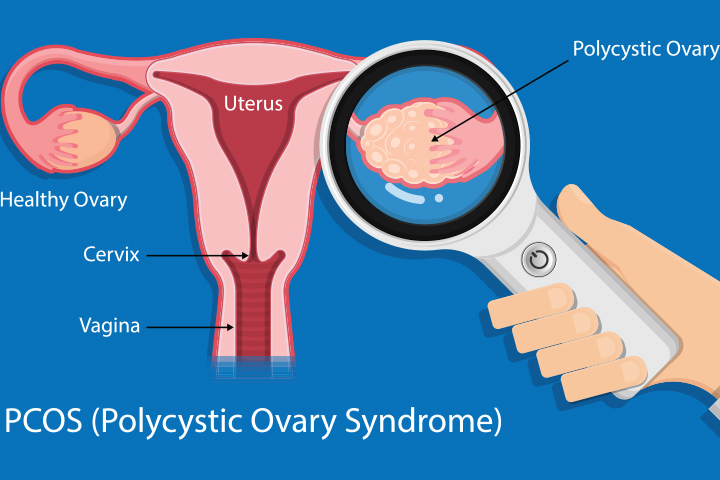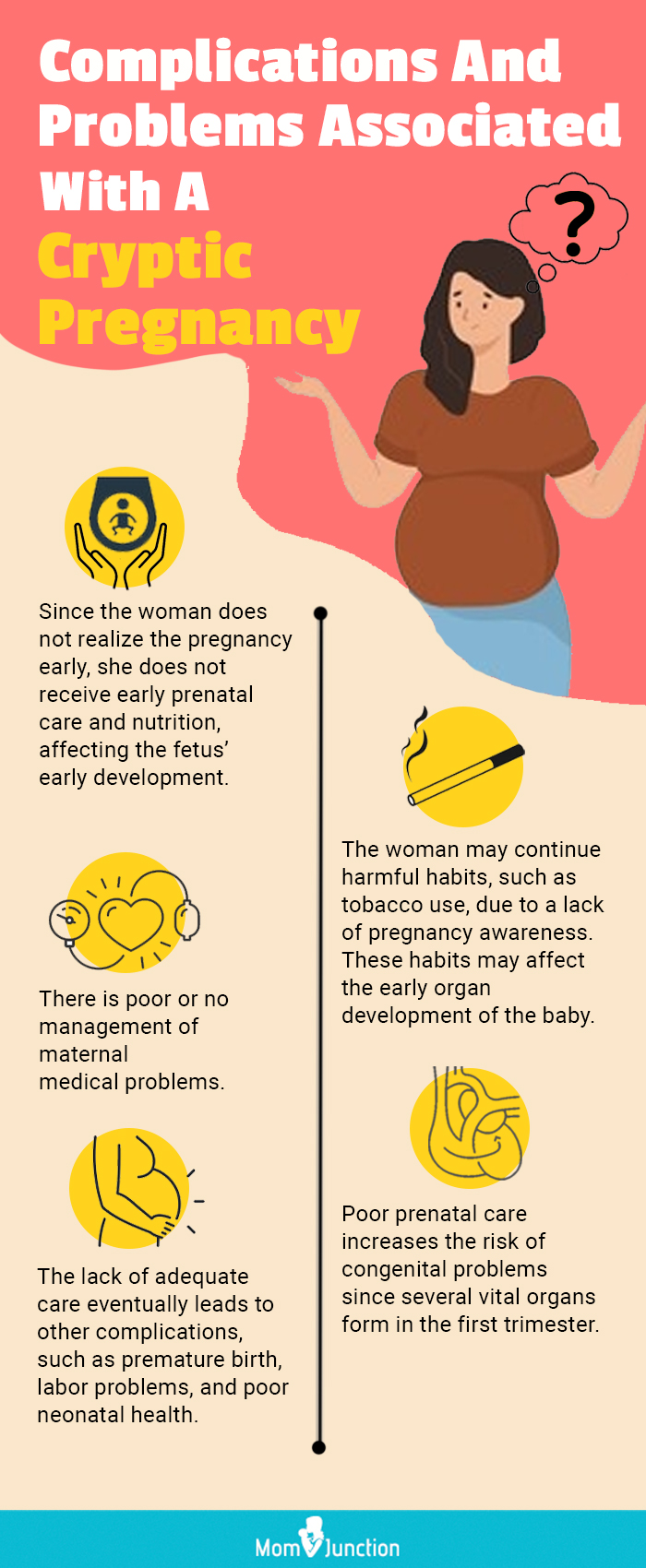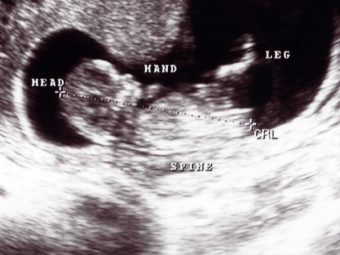
Cryptic pregnancy, sometimes called stealth pregnancy or concealed gestation, is when a woman is unaware of her pregnancy; it goes undetected until the end of gestation. A woman who has this type of pregnancy may not have positive results on standard pregnancy tests, and she may not develop any noticeable signs and symptoms of pregnancy.
A cryptic pregnancy may occur due to low hCG (human chorionic gonadotropin) hormone levels. Some studies suggest that about 1 in 475 women could be unaware of their pregnancy until the 20th week of gestation (1).
Curious to know more about the occurrence and meaning of cryptic pregnancy? Read on as we explain the vital details about cryptic pregnancy, including its causes, indications, and ways to prevent this peculiar pregnancy phenomenon.
Understanding Cryptic Pregnancy
Cryptic pregnancies or masked conception usually occur in women who have been on birth control methods, reached perimenopause, or have hormonal imbalances. These women come under the ‘least expected pregnancy category’ and experience common pregnancy symptoms such as fatigue and morning sickness mildly, or do not experience anything at all. These symptoms may be mistaken as those of some other condition.
The phenomenon of cryptic pregnancy is explained by the following three hypotheses. These hypotheses explain stealth pregnancy in evolutionary terms. These theories are mutually exclusive, which means the occurrence of any one of them implies the nonoccurrence of others (1):
- Minor changes in the expression of genes might result in reduced maternal involvement in pregnancy. The conflict between mother and fetus in low levels of hCG hormone supports this theory. According to this hypothesis, the fetal risk is increased, but evidence shows that infants do not have any significant health problems other than low birth weight.
Image: IStock
- The mother’s body may reject the fetus if hCG levels are low. It may cause spontaneous abortion. Sometimes, the fetus can produce an hCG level that is enough to survive maternal rejection but not enough to trigger maternal involvement in pregnancy.
- Cryptic pregnancy can be an adaptive method to avoid stress when a woman is not emotionally and socially ready to be a mother.
What Causes Cryptic Pregnancy?
Several hormonal and psychological reasons can lead to cryptic pregnancy. However, the psychological causes are lower than the hormonal.
- Polycystic ovarian syndrome (PCOS): Small cysts form on the enlarged ovaries. Women may have irregular or prolonged cycles due to hormonal imbalance.
Image: Shutterstock
- Recent pregnancy: Hormones may take time to get back to normalcy after your pregnancy. Recent childbirth and lactation may cause amenorrheaiXAbsence of menstrual periods in a woman of reproductive age caused by hormonal imbalances, pregnancy, or certain medical conditions , and women might not know when they started ovulating again. If you are pregnant immediately, there would be hormonal imbalance causing a cryptic pregnancy.
- Low body fat could trigger a hormonal imbalance, as in the case of athletes.
- Perimenopause is the time when the body starts showing signs of menopause, such as irregular cycles. It can begin as early as in the 30s, making the pregnancy go unidentified.
- Failure of birth control methods such as pills, Depo Provera, or Mirena could result in an unexpected pregnancy (2). Pregnancy hormones can be interrupted by the hormones released from these contraceptives.
Image: Shutterstock
- High-stress levels can cause a cryptic pregnancy as they influence the hormones.
These women come under the ‘least expected pregnancy category’ and also may not experience common symptoms of pregnancy, such as morning sickness.
What Is The Duration Of Cryptic Pregnancy?
There is no evidence to determine the duration of the gestation period of cryptic pregnancy. That’s mainly because the woman might not know when the pregnancy started. However, a few pieces of anecdotal evidence shows that a cryptic pregnancy may last longer than a normal pregnancy as the development is slower due to low hormones. Sometimes, there could be regular periods during a cryptic pregnancy due to the partial shedding of the endometrial lining.
Even in such a case, it becomes difficult to determine the duration. Some cryptic pregnancy cases that have been reported were shorter than the usual gestation period, while some were longer. Hence, the duration is uncertain.
Even when the pregnancy is cryptic, it could send you some signals.
Cryptic Pregnancy Signs and Symptoms
The cryptic pregnancy symptoms are similar to regular pregnancy. Note that the symptoms vary from one woman to the other.
- Nausea
- Vomiting
- Fatigue
- Food aversions
Image: IStock
- Frequent urination
- Weight gain
- Heartburn
- Headaches
- Abdominal cramps
- Backache
- Metallic taste in the mouth
The symptoms could be similar to those of normal pregnancy. So, how is cryptic pregnancy different from the normal?
How Is A Cryptic Pregnancy Cryptic?
Pregnancy remains a secret because of these reasons:
- You may have regular periods throughout the pregnancy due to partial shedding of the endometrial lining, though the number of bleeding days may be less. Also, spotting and bleeding due to implantation could be mistaken for a regular period.
- Urine and blood tests and ultrasound show negative.
- Slow pregnancy belly growth as the baby is at the back of the womb (at the spine).
- Fetal movements inside the womb are mistaken for gas and bloating.
 Point to consider
Point to considerWhat Happens To The Fetus In Cryptic Pregnancy?
Ashley opens up about her difficult journey through a cryptic pregnancy loss. She recalls, “One day, I woke up and felt something wasn’t right, so I went to the doctor. I thought I had an infection, and then the doctor hit me with the news that I was pregnant! I was pregnant with identical twin boys! Both babies had strong heartbeats. Two weeks later, I went to my OB appointment, and they performed another ultrasound. My doctor had to break the horrible news that both of my twin boys had passed away, and I would have to deliver the babies. This is one of the hardest things I ever had to deal with (i).”
In cryptic pregnancy, the development of the fetus may be delayed and interrupted frequently, taking place at an extremely slow pace. Lack of prenatal care may negatively affect perinataliX Period surrounding childbirth, including the last stages of pregnancy and the early postpartum time outcomes (4). However, some women deliver healthy babies after cryptic pregnancy.
How Can Pregnancy Go Undetected After Missed Periods?
Not all women have regular and monthly periods, and a missed period may not bother them. Even if periods occasionally occur, spotting during pregnancy may be construed as menstrual bleeding. The irregular or less flow could be attributed to stress, menopause, or other health problems.
Continued Periods/Bleeding In Cryptic Pregnancy
Most women keep getting their regular periods throughout the cryptic pregnancy, but this does not indicate a miscarriage. It can be heavy, light, or spot bleeding with a few large or small clots. The bleeding can be bright red, pink, brown, purple, orange, or black. It can be like a normal period, sporadic, or random. The bleeding could sometimes last for weeks or months, but all it does is shed away the uterine lining. This results in little or no hCG.
How Is A Negative Test Result Possible?
In a normal pregnancy, the pregnancy test shows negative if it is taken too early or if you fail to follow the instructions correctly.
But in a cryptic pregnancy, the result is negative because the level of hCG is negligible. The placenta usually secretes hCG, which passes along the lining of the uterus. It builds up and is shown in the urine and blood. In cryptic pregnancy, the lining of the uterus sheds periodically without giving hCG the scope to build up and show up in tests.
Moreover, if you are not anticipating a pregnancy, you would not take the test.
How Does Cryptic Pregnancy Go Undetected In Ultrasound?
In a known pregnancy, the doctor will do a transvaginal ultrasound in the early phase of pregnancy, followed by abdominal ultrasound tests regularly until the due week.
However, in most cryptic pregnancy cases, women may not consider going to the doctor or getting an ultrasound. Even if they do, ultrasound scans cannot detect the growing fetus in a majority of women. It may be due to irregular implantation of the embryo, abnormal shape of the uterus, or technical errors in the ultrasound device. The following abnormalities in the abdominal region or uterus may give a false negative result:
- Uterine retroversion: It is also known as tipped or tilted uterus, where the uterus is inclined towards the back of the pelvis, unlike a vertical position (as in a normal uterus). This position makes it difficult to see the fetus in an ultrasound during early gestation.
- Bicornuate uterus: It is a congenital abnormality wherein the uterus is heart-shaped, with two horns. A wall splits the uterus either completely or partially. It can thus affect the reproductive abilities of a woman and also result in cryptic pregnancy.
- Abnormal scar tissue: An abnormal scar tissue can happen due to abdominal surgery, C-section, or tummy tucks, among others. This scar tissue prevents the ultrasound waves from passing into the uterus, showing negative results on the scan.
Why Does Cryptic Pregnancy Have Longer Gestational Period?
Low levels of hCG hormones may reduce maternal involvement in pregnancy and prevent the body from generating signals essential for baby development. The fetus will thus grow slowly. The babies measure smaller than they should be at various pregnancy phases.
Possible Complications Of Cryptic Pregnancy
There would not be prenatal care, as you are not aware of your pregnancy. The delivery, thus, turns out to be unassisted, at home, or in an emergency room.
- Prenatal complications such as hypertension, diabetes, or blood group incompatibility will go undetected, putting both the mother and baby at risk.
- The mother may not avoid certain habits such as smoking or drinking.
 Expert says
Expert saysCryptic Pregnancy Labor
Image: Shutterstock
Labor and childbirth at the end of cryptic pregnancy will be physically the same as in normal pregnancy. Unexpected contractions may feel like severe cramps. Women may experience more psychological distress during delivery since they would not be expecting it. The following symptoms may help you recognize that you are in labor after an unidentified pregnancy:
- Back pain
- Nausea
- Vomiting
- Hot flashes
- Chills
- Dizziness
- Cold sweats
- Diarrhea
- Body ache
- Pain in the legs that radiates to the thighs
- Mood swings
- Pain in the hip and pelvic region
- PalpitationsiXAbnormal heart rhythms often caused by stress, anxiety, or medical conditions
- Swelling of the vaginal walls due to increased blood flow
- Painful breasts. Sometimes, the pain can be shooting, sharp pain
- Pressure on the cervix
- Stabbing pain in the sides, just like you get after running
- Tugging or pulling sensation in the abdomen which may or may not be painful
You may experience all or a few of these symptoms during labor. In most cases, the actual process of cryptic pregnancy delivery is sudden and does not last long. It may be due to premature birth and low birth weight due to a lack of prenatal care or ignoring and mistaking labor symptoms (3). If you are experiencing intense cramping and uncertain that you are in labor, it is recommended to get immediate medical help.
Real Stories Of Cryptic Pregnancy
Although the case of cryptic pregnancy is rare, there are some surprising stories.
- A week before turning 18, Beth complained of experiencing severe cramps. She went to the hospital, where she was asked if she was pregnant. She said she had taken a pregnancy test a few weeks before, the result of which was negative. After that, she didn’t have sex. But soon after reaching the hospital, she delivered a healthy full-term baby.
- Klara Dollan, then 22, started her day by going to the office. She had intense stomach cramps, so she left her workplace and reached home. The cramps were turning bad with every minute. Her neighbor arrived and called the ambulance. Until the ambulance came, she started bleeding and then delivered a baby. After reaching the hospital, she was told that it was a case of cryptic pregnancy.
- Charlotte Thomson had a flat stomach and regular periods. After a week of the office party, she had pain and was admitted to the hospital. The doctor noticed bleeding and said she is in labor. And then she delivered a healthy baby girl, who was named Molly.
How To Prevent Cryptic Pregnancy?
During the reproductive age, if you are continuously experiencing specific pain or changes in the abdomen or pelvis, you should immediately see a doctor.
If you do not get regular periods, and are active sexually, take repeated pregnancy tests. You should speak to your gynecologist about irregular periods and get a thorough checkup. You should also get a checkup done if you think you have entered menopause. Though it is rare, cryptic pregnancy is a real medical condition.
Frequently Asked Questions
1. How will the cryptic pregnancy baby movement be?
The fetal movements in cryptic pregnancies are the same as in normal pregnancy. Sometimes, the fetus may have fewer movements if there is a delay in development. In most cases, women may misinterpret fetal movements as gas or muscle spasms.
2. How long does a cryptic pregnancy last?
Cryptic pregnancy can be for the same duration as a normal pregnancy. It can also be for a shorter or longer duration. The length of pregnancy depends on maternal and fetal factors contributing to preterm, term, or post-term birth, similar as in typical pregnancy. There is no reliable data showing the exact length of stealth pregnancies.
3. How to confirm a cryptic pregnancy?
If there is a suspicion of pregnancy and the conventional pregnancy tests such as blood and urine tests, and an ultrasound scan is negative, your practitioner may use a Doppler (monitors fetal heart rate) to confirm the pregnancy (4).
4. How common is cryptic pregnancy?
The prevalence of cryptic pregnancy is not well established as they are rare. Some studies suggest that about 1 in 475 pregnancies go unnoticed up to 20 weeks of gestation, while others indicate that 1 in 250 pregnancies go unnoticed until delivery (6). However, the actual incidence may be higher due to underreporting and misdiagnosis.
5. What are the emotional and psychological effects of cryptic pregnancy?
Cryptic pregnancy may affect a woman’s emotional and psychological well-being as it may be associated with total denial of pregnancy until delivery. Lack of neonatal care due to unawareness may lead to pregnancy loss, adding to stress and anxiety.
Cryptic pregnancies may occur in women who suffer from hormonal imbalances or have reached perimenopause. Since these women experience common symptoms such as fatigue, nausea, frequent urination, or mild morning sickness, their pregnancy may go unnoticed until the end of gestation. Even the partial shedding of the endometrial lining during a cryptic pregnancy might hide the condition. Although there have been reported cases of women with cryptic pregnancies delivering a healthy full-term baby, such unexpected pregnancies and deliveries might be stressful. Hence, if you are sexually active, take pregnancy tests frequently. Also, inform your gynecologist if you experience irregular periods or notice other pregnancy-related accompanying signs.
Infographic: What Are The Complications Associated With A Cryptic Pregnancy?
Being aware of pregnancy and ensuring timely prenatal care can improve pregnancy outcomes. However, it may not be possible for most women with a cryptic pregnancy. The lack of adequate care due to a cryptic pregnancy may increase the risk of certain conditions. Go through the infographic to know the complications of cryptic or stealth pregnancy. Illustration: Momjunction Design Team
Key Pointers
- Cryptic pregnancy refers to a situation where a mother is unaware of her pregnancy until late in the gestation period.
- Women who are on birth control, have hormonal abnormalities, or are in perimenopause are at a higher risk of experiencing cryptic pregnancies.
- The duration of cryptic pregnancy is uncertain because women may not know when it began, but it suggests it may last longer due to slow development.
- Signs of cryptic pregnancy might be the same as those of a regular pregnancy, including nausea, exhaustion, and weight gain.
- Cryptic pregnancy can go undetected due to regular periods, negative pregnancy tests, sluggish belly growth, and an inaccurate sense of fetal motions.
Image: Dall·E/MomJunction Design Team
Personal Experience: Source
MomJunction articles include first-hand experiences to provide you with better insights through real-life narratives. Here are the sources of personal accounts referenced in this article.
i. Twinsie’s;https://mygentleheart.com/2023/06/20/twinsies/
References
1. Del Giudice M; The evolutionary biology of cryptic pregnancy: A re-appraisal of the “denied pregnancy” phenomenon
2. Contraception; The Centers for Disease Control and Prevention
3. Orvos H; The perinatal outcome of pregnancy without prenatal care. A retrospective study in Szeged, Hungary
4. Ji Young Kwon and In Yang Park; Fetal heart rate monitoring: from Doppler to computerized analysis
5. Can You Be Pregnant and Not Know It?; Cleveland Clinic
6. Cryptic Pregnancy; Cleveland Clinic























